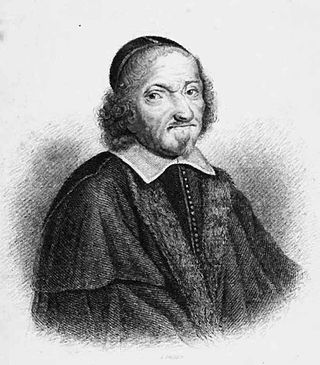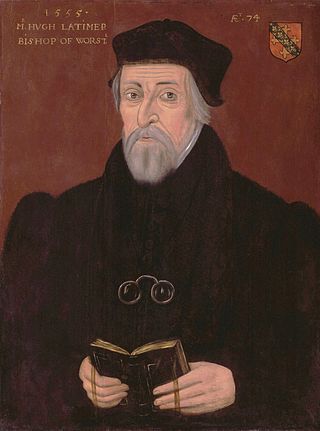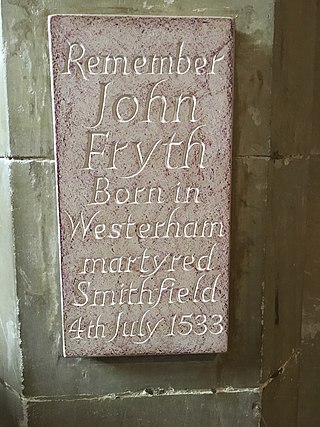Related Research Articles

Sir Thomas More, venerated in the Catholic Church as Saint Thomas More, was an English lawyer, judge, social philosopher, author, statesman, amateur theologian, and noted Renaissance humanist. He also served Henry VIII as Lord High Chancellor of England from October 1529 to May 1532. He wrote Utopia, published in 1516, which describes the political system of an imaginary island state.
William Tyndale was an English Biblical scholar and linguist who became a leading figure in the Protestant Reformation in the years leading up to his execution. He translated much of the Bible into English, and was influenced by the works of prominent Protestant Reformers such as Martin Luther.

Myles Coverdale, first name also spelt Miles, was an English ecclesiastical reformer chiefly known as a Bible translator, preacher, hymnist and, briefly, Bishop of Exeter (1551–1553). In 1535, Coverdale produced the first printed translation of the full Bible into Early Modern English, completing the translations of William Tyndale.

John Rogers was an English clergyman, Bible translator and commentator. He guided the development of the Matthew Bible in vernacular English during the reign of Henry VIII and was the first English Protestant executed as a heretic under Mary I, who was determined to restore Roman Catholicism.

Robert Barnes was an English reformer and martyr.

Hugh Latimer was a Fellow of Clare College, Cambridge, and Bishop of Worcester during the Reformation, and later Church of England chaplain to King Edward VI. In 1555 under the Catholic Queen Mary I he was burned at the stake, becoming one of the three Oxford Martyrs of Anglicanism.
Early Modern English Bible translations are those translations of the Bible which were made between about 1500 and 1800, the period of Early Modern English. This was the first major period of Bible translation into the English language including the King James Version and Douai Bibles. The Reformation and Counter-Reformation led to the need for Bibles in the vernacular with competing groups each producing their own versions.

John Frith was an English Protestant priest, writer, and martyr.

Rowland Taylor was an English Protestant martyr during the Marian Persecutions.
The Ipswich Martyrs were nine people burnt at the stake for their Lollard or Protestant beliefs around 1515-1558. The executions were mainly carried out in the centre of Ipswich, Suffolk on The Cornhill, the square in front of Ipswich Town Hall. At that time the remains of the medieval church of St Mildred were used for the town's Moot Hall. Later, in 1645 Widow Lakeland was executed on the same site on the orders of Matthew Hopkins, the notorious Witchfinder General.
The Praier and Complaynte of the Ploweman unto Christe: written not longe after the yere of our Lorde. M. and three hundred is a short, anonymous English Christian text, probably written in the late fourteenth or early fifteenth century and first printed in about 1531. It consists of a prose tract, in the form of a polemical prayer, expressing Lollard sentiments and arguing for religious reform. In it, the simple ploughman/narrator speaks on behalf of "the repressed common man imbued with the simple truths of the Bible and a knowledge of the commandments against the mighty and monolithic conservative church". The pastoral-ecclesiastical metaphor of shepherds and sheep is used extensively as a number of criticisms are made about such things as confession, indulgences, purgatory, tithing and celibacy. The Prayer became important in the sixteenth century, when its themes were taken up by proponents of the Protestant Reformation.

Thomas Harding was a sixteenth-century English religious dissident who, while waiting to be burnt at the stake as a Lollard in 1532, was struck on the head by a spectator with one of the pieces of firewood, which killed him instantly.
Events from the 1530s in England.
George Joye was a 16th-century Bible translator who produced the first printed translation of several books of the Old Testament into English (1530–1534), as well as the first English Primer (1529).
Richard Nykke became bishop of Norwich under Pope Alexander VI in 1515. Norwich at this time was the second-largest conurbation in England, after London.
George Constantine was an English priest who was an early Protestant and evangelical reformer.
Thomas Gerard (1500?–1540) was an English Protestant reformer. In 1540, he was burnt to death for heresy, along with William Jerome and Robert Barnes.
John Tewkesbury was a Paternoster Row leather merchant in London and Protestant reformer, convicted of heresy and burned at the stake in West Smithfield, London, on 20 December 1531.
Thomas Swinnerton was an evangelical preacher and author during the English Reformation.
References
- ↑ He is not, however, included in Venn's Alumni Cantabrigienses
- ↑ Maas, Korey (2010). The Reformation and Robert Barnes: History, Theology and Polemic in Early Modern England. Boydell & Brewer. p. 3. ISBN 978-1-84383-534-9.
- ↑ Writing under Tyranny, Greg Walker, Oxford University Press, 2005
- Rainer Haas, Allerlei Protestanten – Christus-Zeugen aus der Tudor-Zeit: 3.Richard Bayfield, der das Bücher-Verbreiten mit seinem Leben bezahlte, Nordhausen, 2010